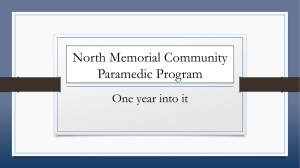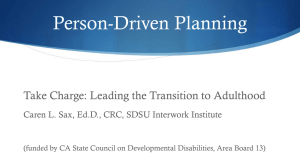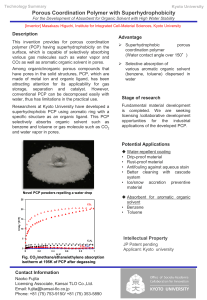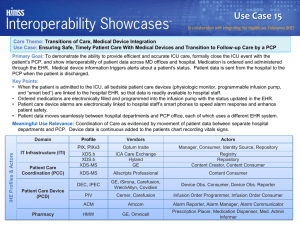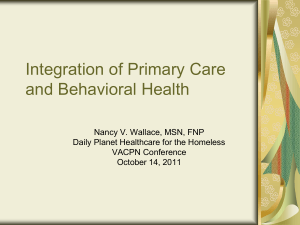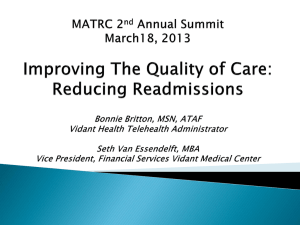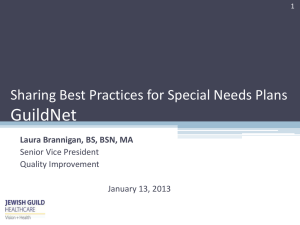33.01A MDCH Mental Health and Substance Abuse Administration
advertisement
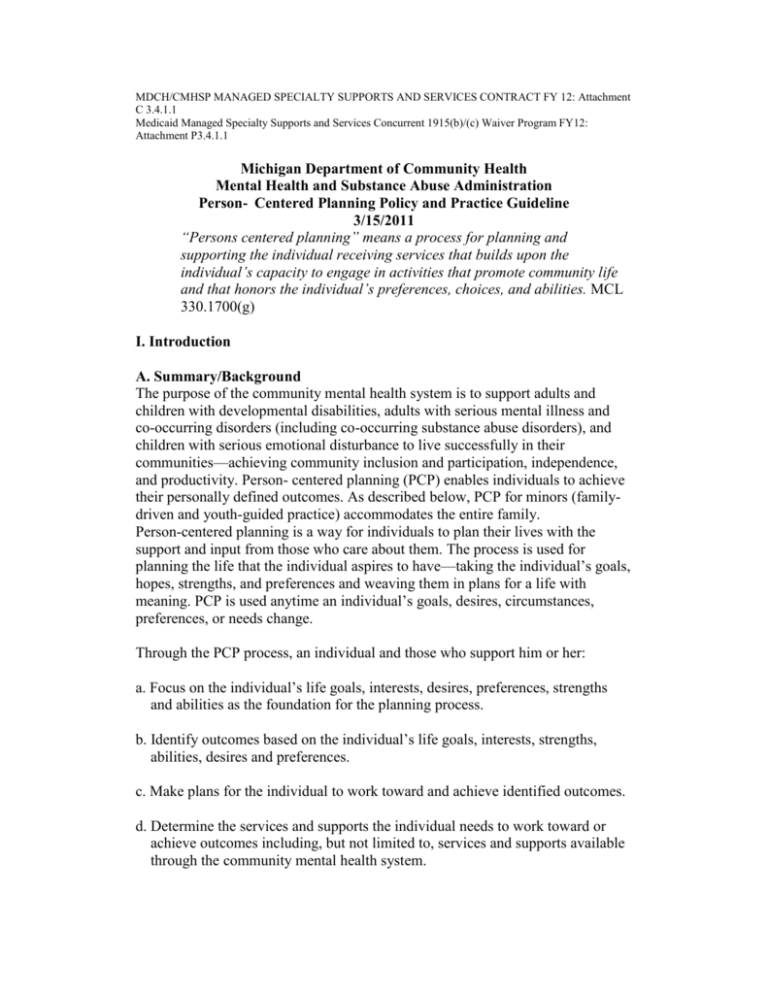
MDCH/CMHSP MANAGED SPECIALTY SUPPORTS AND SERVICES CONTRACT FY 12: Attachment C 3.4.1.1 Medicaid Managed Specialty Supports and Services Concurrent 1915(b)/(c) Waiver Program FY12: Attachment P3.4.1.1 Michigan Department of Community Health Mental Health and Substance Abuse Administration Person‐ Centered Planning Policy and Practice Guideline 3/15/2011 “Persons centered planning” means a process for planning and supporting the individual receiving services that builds upon the individual’s capacity to engage in activities that promote community life and that honors the individual’s preferences, choices, and abilities. MCL 330.1700(g) I. Introduction A. Summary/Background The purpose of the community mental health system is to support adults and children with developmental disabilities, adults with serious mental illness and co-occurring disorders (including co-occurring substance abuse disorders), and children with serious emotional disturbance to live successfully in their communities—achieving community inclusion and participation, independence, and productivity. Person- centered planning (PCP) enables individuals to achieve their personally defined outcomes. As described below, PCP for minors (familydriven and youth-guided practice) accommodates the entire family. Person-centered planning is a way for individuals to plan their lives with the support and input from those who care about them. The process is used for planning the life that the individual aspires to have—taking the individual’s goals, hopes, strengths, and preferences and weaving them in plans for a life with meaning. PCP is used anytime an individual’s goals, desires, circumstances, preferences, or needs change. Through the PCP process, an individual and those who support him or her: a. Focus on the individual’s life goals, interests, desires, preferences, strengths and abilities as the foundation for the planning process. b. Identify outcomes based on the individual’s life goals, interests, strengths, abilities, desires and preferences. c. Make plans for the individual to work toward and achieve identified outcomes. d. Determine the services and supports the individual needs to work toward or achieve outcomes including, but not limited to, services and supports available through the community mental health system. e. Develop an Individual Plan of Service (IPOS) that directs the provision of supports and services to be provided through the community mental health services program (CMHSP). Meaningful PCP is at the heart of supporting individual choice and control. Person-centered planning focuses on the goals, interests, desires and preferences of the individual, while still exploring and addressing an individual’s needs within an array of established life domains (including, but not limited to those listed in the Michigan Mental Health Code (the Code): the need for food, shelter, clothing, health care, employment opportunities, educational opportunities, legal services, transportation, and recreation). As appropriate for the individual, the PCP process may involve other MDCH policies and initiatives including, but limited to, Recovery, Self-Determination, Culture of Gentleness, Positive Behavior Supports, Treatment of Substance Abuse or other Co-Occurring Disorders, and Transition Planning. PCP focuses on services and supports necessary (including medically necessary services and supports funded by the CMHSP) for the individual to work toward and achieve their personal goals rather than being limited to authorizing the individual to receive existing programs. For children, the concepts of person-centered planning are incorporated into a family driven, youth-guided approach (see the MDCH Family-Driven and YouthGuided Policy and Practice Guideline). A family-driven, youth-guided approach recognizes the importance of family in the lives of children and that supports and services impact the entire family. In the case of minor children, the child/family is the focus of planning and family members are integral to success of the planning process. As the child ages, services and supports should become more youthguided especially during transition into adulthood. When the individual reaches adulthood, his or her needs and goals become primary. There are a few circumstances where the involvement of a minor’s family may be not appropriate: a. The minor is 14 years of age or older and has requested services without the knowledge or consent of parents, guardian or person in loco parentis within the restrictions stated in the Mental Health Code; b. The minor is emancipated; or c. The inclusion of the parent(s) or significant family members would constitute a substantial risk of physical or emotional harm to the recipient or substantial disruption of the planning process as stated in the Code. Justification of the exclusion of parents shall be documented in the clinical record. B. Michigan Mental Health Code—Definition PCP, as defined by the Code, “means a process for planning and supporting the individual receiving services that builds upon the individual’s capacity to engage in activities that promote community life and that honors the individual’s preferences, choices, and abilities. The person-centered planning process involves families, friends, and professionals as the individual desires or requires.” MCL 330.1700(g). The Code also requires use of PCP for development of an Individual Plan of Service: “(1) The responsible mental health agency for each recipient shall ensure that a person-centered planning process is used to develop a written individual plan of services in partnership with the recipient. A preliminary plan shall be developed within 7 days of the commencement of services or, if an individual is hospitalized for less than 7 days, before discharge or release. The individual plan of services shall consist of a treatment plan, a support plan, or both. A treatment plan shall establish meaningful and measurable goals with the recipient. The individual plan of services shall address, as either desired or required by the recipient, the recipient’s need for food, shelter, clothing, health care, employment opportunities, educational opportunities, legal services, transportation, and recreation. The plan shall be kept current and shall be modified when indicated. The individual in charge of implementing the plan of services shall be designated in the plan.” MCL 330.1712. C. PCP Values and Principles Person-centered planning is a highly individualized process designed to respond to the expressed needs/desires of the individual. Every individual is presumed competent to direct the planning process, achieve his or her goals and outcomes, and build a meaningful life in the community. Every individual has strengths, can express preferences, and can make choices. The individual’s choices and preferences are honored and considered, if not always implemented. Every individual contributes to his or her community, and has the ability to choose how supports and services enable him or her to meaningfully participate and contribute. Through the person-centered planning process, an individual maximizes independence, creates community connections, and works towards achieving his or her chosen outcomes. An individual’s cultural background is recognized and valued in the person-centered planning process. D. Implementation of Person-Centered Planning While the Code requires that PCP be used to develop an Individual Plan of Service (IPOS) that includes community mental health services and supports, the purpose of person-centered planning is a process for an individual to define the life that he or she wants and what components need to be in place for the individual to have, work toward or achieve that life. Depending on the individual, community mental health services and supports may play a small or large role in supporting him or her in having the life he or she wants. When an individual is in a crisis situation, that situation should be stabilized before the PCP process is used to plan the life the he or she desires to have. Individuals are going to be at different points in the process of achieving the life to which they aspire and the PCP process should be individualized to meet the needs of the individual for whom planning is done, e.g. meeting an individual where he or she is. Some people may be just beginning to define the life they want and initially the PCP process may be lengthy as the individual’s goals, hopes, strengths, and preferences are defined and documented and a plan for achieving them is developed. Once this initial work is completed, it does not need to be redone unless so desired by the individual. Once an IPOS is developed, subsequent use of the planning process, discussions, meetings, and reviews will work from the existing IPOS to amend or update it as circumstances and preferences change. The extent that the IPOS is updated will be determined by the needs and desires of the individual. If and when necessary, the IPOS can be completely redeveloped. The emphasis in using PCP should be on meeting the needs and desires of the individual when he or she has them. II. Essential Elements for Person-Centered Planning The following characteristics are essential to the successful use of the PCP process with an individual and his/her allies. 1. Person-Directed. The individual directs the planning process (with necessary supports and accommodations) and decides when and where planning meetings are held, what is discussed, and who is invited. 2. Person-Centered. The planning process focuses on the individual, not the system or the individual’s family, guardian, or friends. The individual’s goals, interests, desires, and preferences are identified with an optimistic view of the future and plans for a satisfying life. The planning process is used whenever the individual wants or needs it, rather than viewed as an annual event. 3. Outcome-Based. Outcomes in pursuit of the individual’s preferences and goals are identified as well as services and supports that enable the individual to achieve his or her goals, plans, and desires and any training needed for the providers of those services and supports. The way for measuring progress toward achievement of outcomes is identified. 4. Information, Support and Accommodations. As needed, the individual receives comprehensive and unbiased information on the array of mental health services, community resources, and available providers. Support and accommodations to assist the individual to participate in the process are provided. 5. Independent Facilitation. Individuals have the information and support to choose an independent facilitator to assist them in the planning process. See Section III below 6. Pre-Planning. The purpose of pre-planning is for the individual to gather all of the information and resources (e.g. people, agencies) necessary for effective Person-centered planning and set the agenda for the process. Each individual (except for those individuals who receive short-term outpatient therapy only, medication only, or those who are incarcerated) is entitled to use pre-planning to ensure successful PCP. Pre-planning, as individualized for the person’s needs, issued anytime the PCP process is used. The following items are addressed through pre-planning with sufficient time to take all necessary / preferred actions (i.e. invite desired participants): a. When and where the meeting will be held, b. Who will be invited (including whether the individual has allies who can provide desired meaningful support or if actions need to be taken to cultivate such support), c. What will be discussed and not discussed, d. What accommodations the individual may need to meaningfully participate in the meeting (including assistance for individuals who use behavior as communication), e. Who will facilitate the meeting? f. Who will record what is discussed at the meeting. 7. Wellness and Well-Being. Issues of wellness, well-being, health and primary care coordination or integration, supports needed for an individual to continue to live independently as he or she desires, and other concerns specific to the individual’s personal health goals or support needed to the individual to live the way they want to live are discussed and plans to address them are developed. If so desired by the individual, these issues can be addressed outside of the PCP meeting. 8. Participation of Allies. Through the pre-planning process, the individual selects allies (friends, family members and others) to support him or her through the person-centered planning process. Pre-planning and planning help the individual explore who is currently in his or her life and what needs to be done to cultivate and strengthen desired relationships. III. Independent (External) Facilitation In Michigan, individuals receiving support through the community mental health system have a right to choose an independent or external facilitator of the personcentered planning process, unless the individual is receiving short-term outpatient therapy or medication only. The CMHSP must make available a choice of at least two independent facilitators to individuals interested in using independent facilitation. The facilitator is chosen by the individual and serves as the individual’s guide (and for some individuals, their voice) throughout the process, making sure that his or her hopes, interests, desires, preferences and concerns are heard and addressed. The facilitator helps the individual with the pre-planning activities and co-leads any PCP meeting(s) with the individual. The independent facilitator must not have any other role within the CMHSP. The independent facilitator must personally know or get to know the individual who is the focus of the planning including what he or she likes and dislikes as well as personal preferences, goals, modes of communication, and who supports or is important to the individual. The Medicaid Provider Manual (MPM) permits independent facilitation to be provided to Medicaid beneficiaries as one aspect of the coverage called “Treatment Planning” MPM MH&SAA Chapter, Section 3.25. If the independent facilitator is paid for the provision of these activities, the PIHP may report the service under the code H0032. It is advisable that the CMHSP support independent facilitators in obtaining training in PCP, regardless of whether the independent facilitator is paid or unpaid. IV. Individual Plan of Service The Code establishes the right for all individuals to develop individual plans of services (IPOS) through a person‐ centered planning process regardless of disability or residential setting. However, an IPOS needs to be more than the services and supports authorized by the community mental health system; it must include all of the components described below. The PCP process must be used at any time the individual wants or needs to use the process. The agenda for each PCP meeting should be set by the individual through the pre‐ planning process, not by agency or by the fields or categories in a form or an electronic medical record. Once an individual has developed an IPOS through the PCP process, the IPOS shall be kept current and modified when needed (reflecting changes in the intensity of the individual’s needs, changes in the individual’s condition as determined through the PCP process or changes in the individual’s preferences for support). Assessment may be used to inform the PCP process, but is not a substitute for the process. The individual and his or her case manager or supports coordinator should work on and review the IPOS on a routine basis as part of their regular conversations. An individual or his/her guardian or authorized representative may request and review the IPOS at any time. A formal review of the plan with the beneficiary and his/her guardian or authorized representative shall occur not less than annually through the PCP process to review progress toward goals and objectives and to assess beneficiary satisfaction. Reviews will work from the existing plan to amend or update it as circumstances, needs, preferences or goals change or to develop a completely new plan if so desired by the individual. Use of the PCP process in the review of the plan incorporates all of the Essential Elements as desired by the individual. The individual decides who will take notes or minutes about what is discussed during the person-centered planning process. In addition, documentation maintained by the CMHSP within the Individual Plan of Service must include: (1) A description of the individual’s strengths, abilities, goals, plans, hopes, interests, preferences and natural supports; (2) The outcomes identified by the individual and how progress toward Achieving those outcomes will be measured; (3) The services and supports needed by the individual to work toward or achieve his or her outcomes including those available through the CMHSP, other publicly funded programs (such as Home Help, Michigan Rehabilitation Services (MRS)), community resources, and natural supports; (4) The amount, scope, and duration of medically necessary services and supports authorized by and obtained through the community mental health system. (5) The estimated/prospective cost of services and supports authorized by the community mental health system. (6) The roles and responsibilities of the individual, the supports coordinator or case manager, the allies, and providers in implementing the plan. (7) Any other documentation required by Section R 330.7199 Written plan of services of the Michigan Administrative Code. The individual must be provided with a written copy of his or her plan within 15 business days of conclusion of the PCP process. This timeframe gives the case manager/ supports coordinator a sufficient amount of time to complete the documentation described above. V. Organizational Standards The following characteristics are essential for organizations responsible for providing supports and services through PCP: Individual Awareness and Knowledge—The organization provides accessible and easily understood information, support and when necessary, training, to individuals using services and supports and those who assist them so that they are aware of their right to PCP, the essential elements of PCP, the benefits of this approach and the support available to help them succeed (including, but not limited, pre-planning and independent facilitation). Person-Centered Culture–The organization provides leadership, policy direction, and activities for implementing person-centered planning at all levels of the organization. Organizational language, values, allocation of resources, and behavior reflect a person-centered orientation. Training- The organization has a process to identify and train staff at all levels on the philosophy of PCP. Staff who are directly involved in PCP are provided with additional training. Roles and Responsibilities—As an individualized process, PCP allows each individual to identify and work with chosen allies and other supports. Roles and responsibilities for facilitation, pre‐ planning, and developing the IPOS are identified; the IPOS describes who is responsible for implementing and monitoring each component of the IPOS. Quality Management—The QA/QM System includes a systemic approach for measuring the effectiveness of PCP and identifying barriers to successful person- centered planning. The best practices for supporting individuals through PCP are identified and implemented (what is working and what is not working in supporting individuals). Organizational expectations and standards are in place to assure support the individual directs the PCP process and ensures that PCP is consistently done well. VI. Dispute Resolution Individuals who have a dispute about the PCP process or the IPOS that results from the process have the rights to grievance, appeals and recipient rights as set forth in detail in the Contract Attachment 6.4.1.1 Grievance and Appeal Technical Requirement/PIHP Grievance System for Medicaid Beneficiaries. As described in this Contract Attachment, some of the dispute resolution options are limited to Medicaid beneficiaries and limited in the scope of the grievance (such as a denial, reduction, suspension or termination of services). Other options are available to all recipients of Michigan mental health services and supports. Supports Coordinators, Case Managers and Customer Services at PIHP/CMHSPs must be prepared to help people understand and negotiate dispute resolution processes.
